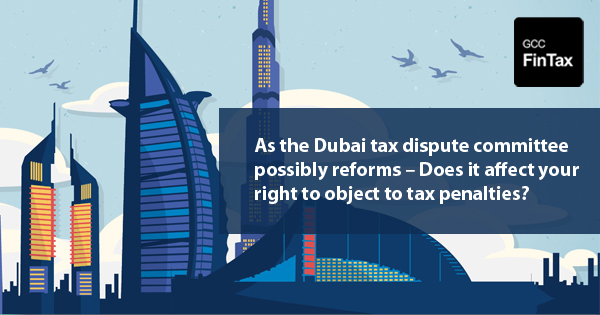
Brief
The tax dispute resolution committees were formed pursuant to the Tax Procedures Law, its Executive Regulations, and specifically Cabinet Decision No. 23/2018.
The Dubai tax dispute resolution committee (“Dubai TDRC”) was formed pursuant to Ministerial Decision No. 109/2019 which named the primary judge, the two experts, and the alternate judge as the committee members.
The Dubai TDRC has jurisdiction to accept and rule on objections by persons domiciled in, or with a tax registration address, in the Emirate of Dubai.
There are two other committees in the Emirate of Abu Dhabi and the Emirate of Sharjah, but this article focuses on the potential reform of the Dubai TDRC.
Currently, it is believed that the Dubai TDRC may be undergoing reform which could ultimately affect objections that are currently filed or will be filed in the near future until new committee members are appointed by Ministerial Decree.
What happens to objections if the committee is inoperable?
If a person (domiciled in Dubai for tax purposes) disagrees with a decision by the Federal Tax Authority and commences the reconsideration process but does not obtain a favorable outcome, the subsequent procedure would be to object before the Dubai TDRC.
The objection is lodged with the tax dispute resolution department of the Ministry of Justice that is responsible for lodging the objection with the Dubai TDRC within two weekdays as of the date of the filing.
Once the Dubai TDRC receives the objection, a decision must be rendered within a maximum of forty weekdays which comprises of an initial twenty weekday period, and an additional twenty weekday extension period. The extension can be granted based on the request of the objector or the Federal Tax Authority, or if the Dubai TDRC deems it necessary.
After the procedure before the Dubai TDRC is concluded, either the objector or the Federal Tax Authority can challenge the committee’s decision before the Federal Primary Court.
Here the question becomes; what if a committee is undergoing reform and does not issue a decision?
Does the objector have to wait, or can they continue their dispute before the Federal Primary Court?
To briefly address these questions, we draw reference to a case where a similar committee was yet to be formed, and the litigant proceeded to file their claim before the Courts directly, which was found to be a valid procedure by the Federal Supreme Court.
Federal Supreme Court case where an administrative committee was not formed
In 2001, conciliation and arbitration committees (“CAC”) were established within the Federal Courts to decide on certain disputes before those disputes were to be filed before the Federal Primary Court.
By 2008, one of the Federal Courts had not yet set up a CAC, and a litigant bypassed the CAC and filed their case directly before the Federal Primary Court on the basis that the CAC was not formed.
The Federal Primary and Federal Appeals Court rejected the claim based on the grounds that the litigant had not registered their dispute before the CAC prior to filing the claim with the Federal Primary Court, and that such procedure was mandated by law.
However, the Federal Supreme Court overturned the lower courts’ judgments and ordered that if the Minister of Justice does not issue a decree forming the CAC for it to be competently operable, litigants may plead their case before the Federal Primary Court directly.
Disclaimer: Content posted is for informational & knowledge sharing purposes only, and is not intended to be a substitute for professional advice related to tax, finance or accounting. The view/interpretation of the publisher is based on the available Law, guidelines and information. Each reader should take due professional care before you act after reading the contents of that article/post. No warranty whatsoever is made that any of the articles are accurate and is not intended to provide, and should not be relied on for tax or accounting advice.
You can access Law including Guidelines, Cabinet & FTA Decisions, Public Clarifications, Forms, Business Bulletins for all taxes (Vat, Excise, Customs, Corporate Tax, Transfer Pricing) for all GCC Countries in the Law Section of GCC FinTax.